The fungi that could help future-proof global protein supplies
Present in all living organisms, proteins are crucial for essential chemical processes in the human body, such as metabolic functions. Humans get proteins from foods such as meat, poultry, seafood, beans, peas, eggs, processed soy products, nuts and seeds. But supplying a growing global population with the diet needed for healthy protein intake is increasingly a challenge; compounded by unsustainable food production practices which are damaging the environment. The EU-supported SMART PROTEIN project set out to develop a new generation of plant-based food products (dairy, meat and fish alternatives and infant food formula) through bioprocessed protein crops such as quinoa, lentil, fava bean and chickpea – the fungus upcycled from brewery and bakery/pasta by-products. The team successfully validated and demonstrated several food processing strategies/ingredients and plant-food products at the industrial scale. “And our regenerative agriculture practices, validated in a model farm, increased soil bioactivities significantly, boosting the soil microbiome and organic matter, while reducing soil erosion,” says project coordinator Emanuele Zannini.
The fungi-based food transition
SMART PROTEIN set out to tackle the whole food value chain, involving farm model validation of regenerative protein crop production, plant protein extraction and utilisation, and food design – alongside a better understanding of the impacts on human nutrition and the market. Fungus fermentation was optimised to repurpose by-products upcycled from pasta (pasta residues), bread (bread crust) and beer (spent yeast and brewery spent grain). Structure- and flavour-modifying techniques were then used to increase the digestibility and consumer acceptance of the food items. In several foods, the team were able to use less-refined food ingredients, ensuring the inclusion of key minerals and vitamins otherwise lost during protein extraction and processing. “We were especially proud of our very tasty plant-based fish and cheese substitutes, that I am confident will be industrialised further by our partners,” notes Zannini. Food industry validation and demonstration tests assessed the feasibility of this innovative food production process and the quality of the resultant products. Another promising result was the demonstration of soil rejuvenation, thanks to regenerative agricultural practices such as using microalgae and insects.
Reshaping our whole food environment
As well as developing resource-efficient environmentally friendly protein sources, SMART PROTEIN also set out to support wider EU initiatives for a more sustainable and resilient food supply chain. Zannini argues that food and food nutrition education and training are key, as are stricter and smarter rules related to rules around food procurement. “The food revolution won’t happen without addressing ecosystem challenges, so we prioritised linking different food system actors – from producers, to processors, nutritionists and sustainability experts – aligning them towards the goal of producing more, better, with less,” adds Zannini. An output from these networking efforts was a policy brief outlining the key actions for the EU to hasten the necessary dietary transition. The brief has been considered by several European Commission Directorates-General, including AGRI, GROW and SANTE. The team is now focused on improving its plant/fungus ingredients and processing techniques, to simplify the food formulation and reduce costs, before looking at patent possibilities. Meanwhile, work is ongoing to help educate the public on a ‘clean eating’ approach, including increased consumer acceptance through public demonstrations.
Keywords
SMART PROTEIN, protein, food, pasta, beer, nutrition







